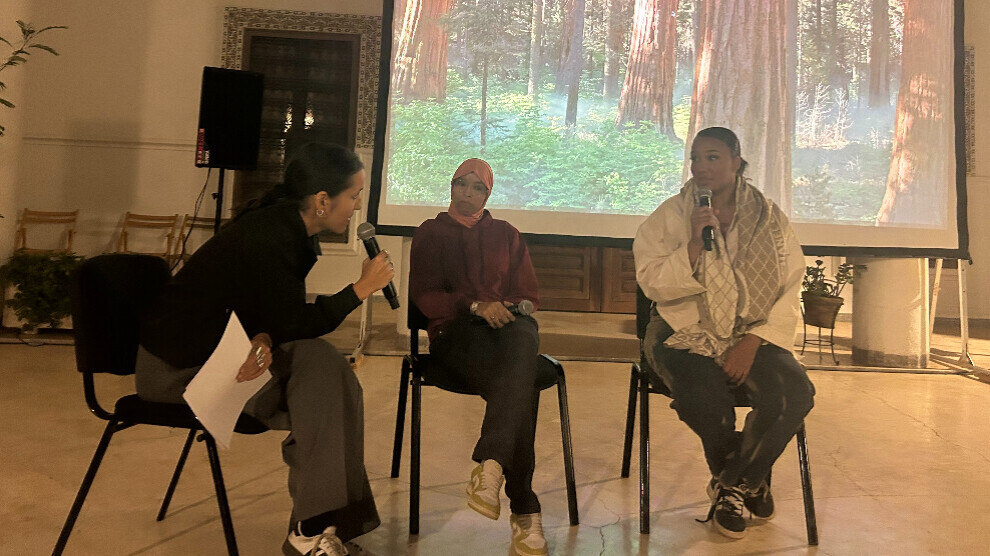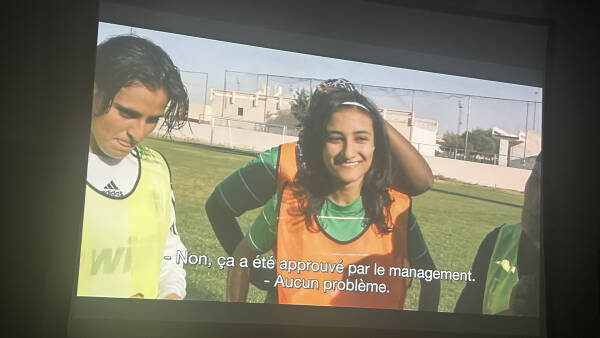Fields of Freedom: How Libyan Women Footballers Broke the Fear Barrier
As part of a film screening series organized by the Dar Bellarj Foundation in Marrakech, the documentary “Fields of Freedom” by Libyan director Nazeeha Arebi was shown, highlighting Libyan girls’ struggle to claim their right to play football.

Raja Khairat
Morocco — During the screening of the documentary “Freedom Fields,” participants emphasized the importance of resilience and defiance in the face of social constraints that hinder women’s participation in football. They also rejected stereotypes linking appearance to athletic competence, affirming that “women’s football is gaining significant attention and asserting itself strongly on the sports scene.”
The Dar Bellarj Foundation, dedicated to culture and heritage, organized a film cycle titled “Permitted Dreams.” As part of the program, the documentary “Freedom Fields” by Libyan director Nazeeha Arebi was screened on Wednesday, November 5, at the foundation’s headquarters in the old city of Marrakech. The film received enthusiastic reactions from the audience, including two players from Phoenix Women’s Football Club in Marrakech, who shared their personal journeys of pursuing professional football careers despite societal and patriarchal challenges that still belittle women’s athletic skills.
Set in post-revolution Libya, following the fall of Muammar Gaddafi’s regime, the film unfolds amid chaos and internal conflict. Within this turbulent context, a group of Libyan girls decide to rebel against social restrictions and fight for their right to play football and compete internationally.
The film follows the journey of three young women who broke the silence and asserted their place in women’s football, despite the Libyan Football Federation’s surrender to pressure from conservative forces that imposed their moral codes on society. Through perseverance and determination, the players overcome social barriers and succeed in participating in an Arab championship in Lebanon, defying bans, intimidation, and isolation.
Freedom Fields captures moving moments of women’s triumph and the breaking of chains imposed by ISIS, which sought to control Libyan society under the guise of “Islamic law.” Confronting extremist ideology, the players’ voices rise in defiance, demanding freedom. As one of the film’s heroines declares:
“Every time I run on the field, I break another layer of fear.

“Permitted Dreams”
On the sidelines of the screening, Sara Mounia Kachiri, coordinator of the film series, explained that the event falls within a program focused on gender equality. It is part of a broader cinematic initiative titled “Permitted Dreams,” which highlights women’s aspirations and their right not only to dream but also to fulfill those dreams.
She added that the program had previously screened “Mothers” by Moroccan director Mariam Bakir, a film addressing the issue of single mothers. Today’s screening of “Freedom Fields” sheds light on women’s football in Libya during and after the Arab Spring, a period marked by social and political upheaval. The final screening, scheduled for next week, will feature “Under the Fig Trees,” a film exploring the dreams of young people and the complex relationships that shape their lives.

Women’s Football: Perseverance and Defiance
Goalkeeper Rawiya Belmokadem shared her personal experience, which mirrors that of the film’s protagonists. She said that resilience and determination are essential traits for any female football player, especially in male-dominated societies that view women as intruders in a traditionally masculine field.
Belmokadem explained that her journey into football was far from easy. She initially faced strong opposition from her father, who refused to accept that his daughter would play a sport considered exclusive to men. His conviction that football was “not suitable for women” became a major challenge at the start of her career. Yet, she refused to give up—holding on to her dream with persistence until she joined the national women’s team and competed in several international tournaments. Her success, she said, was not only an athletic achievement but also tangible proof of her ability, one that changed her father’s mind and earned her the respect of those who once opposed her.
She also highlighted that some players are married mothers, proving that football does not conflict with motherhood or family life. Belmokadem called on young girls to hold on to their dreams and ignore criticism, emphasizing that “women’s football is no longer marginal—it now commands a strong presence in the sports arena and attracts growing audiences, including men.

A Shift in Mentalities
Fatiha Fatah, a player for Marrakech’s Phoenix women’s football club, said she discovered her passion for the game at a young age, playing with neighborhood children, where her talent quickly stood out. Her neighbors encouraged her father to enroll her in a club to pursue football professionally—a decision he eventually made after recognizing his daughter’s talent and deep attachment to the sport.
Addressing the issue of fathers refusing to let their daughters play football, Fatah noted that “mentalities have changed significantly” since Morocco’s women’s national team competed in the recent World Cup. Their multiple victories inspired many parents to believe in their daughters’ abilities and even push them toward professional clubs.
Connecting her remarks to the film’s themes, Fatah pointed out that Moroccan and Libyan players share similar challenges, particularly the condescending view toward women footballers. Yet, the film’s heroines sent a powerful message of resilience and determination—training late at night despite the absence of security—turning football into a risky but empowering adventure.
